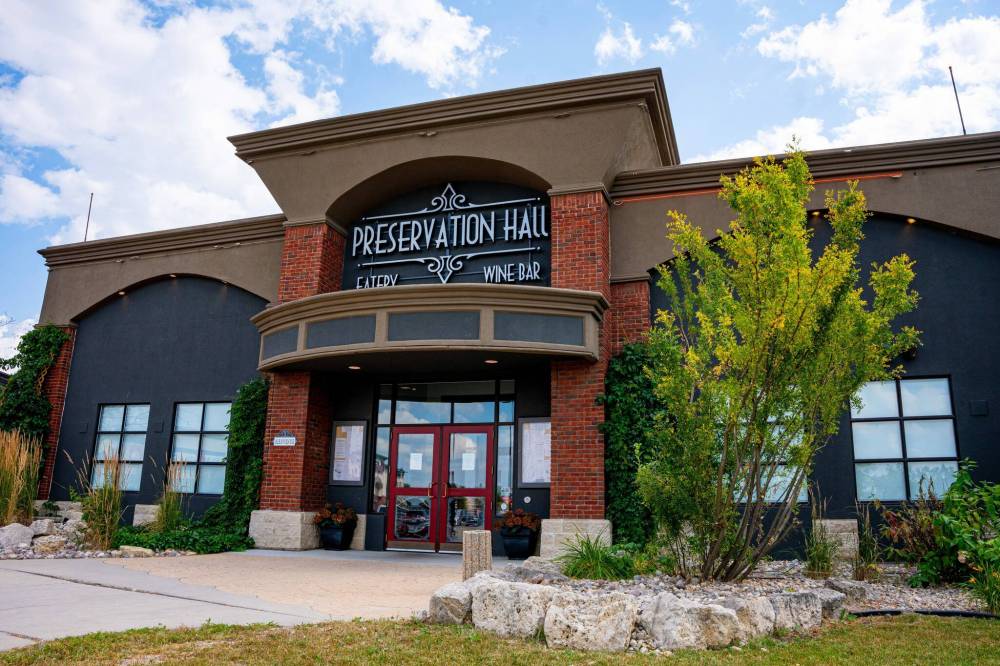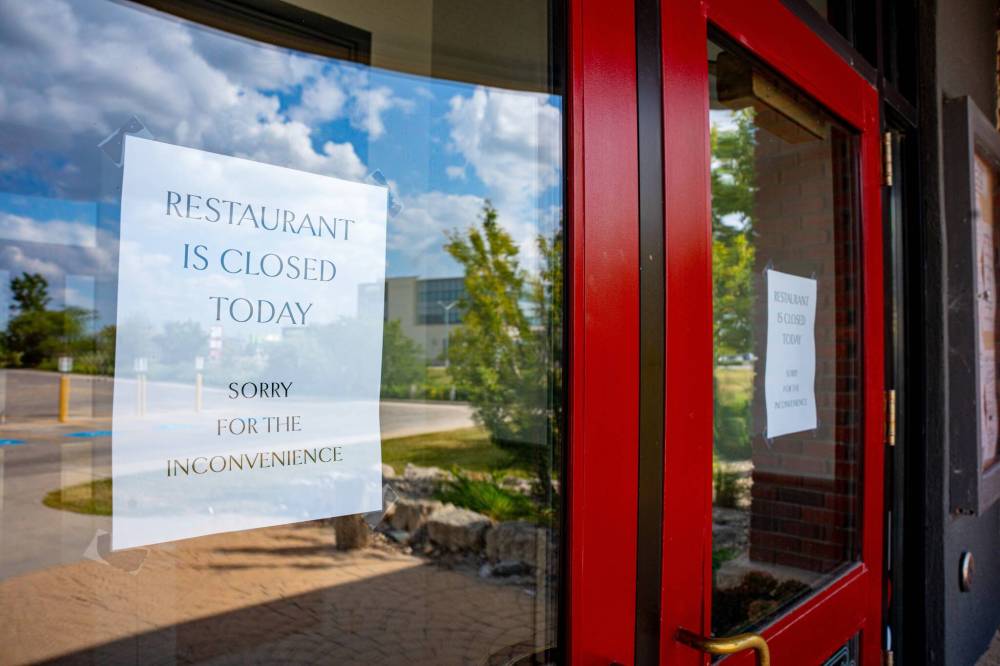‘It was a perfect storm’ Launched during pandemic, Preservation Hall landed in a mountain of debt and rising costs
Read this article for free:
or
Already have an account? Log in here »
To continue reading, please subscribe:
Monthly Digital Subscription
$0 for the first 4 weeks*
- Enjoy unlimited reading on winnipegfreepress.com
- Read the E-Edition, our digital replica newspaper
- Access News Break, our award-winning app
- Play interactive puzzles
*No charge for 4 weeks then price increases to the regular rate of $19.95 plus GST every four weeks. Offer available to new and qualified returning subscribers only. Cancel any time.
Monthly Digital Subscription
$4.99/week*
- Enjoy unlimited reading on winnipegfreepress.com
- Read the E-Edition, our digital replica newspaper
- Access News Break, our award-winning app
- Play interactive puzzles
*Billed as $19.95 plus GST every four weeks. Cancel any time.
To continue reading, please subscribe:
Add Free Press access to your Brandon Sun subscription for only an additional
$1 for the first 4 weeks*
*Your next subscription payment will increase by $1.00 and you will be charged $16.99 plus GST for four weeks. After four weeks, your payment will increase to $23.99 plus GST every four weeks.
Read unlimited articles for free today:
or
Already have an account? Log in here »
Hey there, time traveller!
This article was published 13/08/2024 (514 days ago), so information in it may no longer be current.
Signs papering Preservation Hall read “restaurant is closed today.”
The notices are relevant tomorrow and each day after. Preservation Hall launched during the COVID-19 pandemic and landed in a mountain of debt and rising costs.
“It was a perfect storm,” said general manager Melanie Foucault. “Everything that could go wrong did.”
She and her husband Tristan — an acclaimed chef — decided to open their own space after marrying in 2019. They scouted a location and signed a lease at 655 Empress St., near CF Polo Park, in December of 2019.
NIC ADAM / FREE PRESS Preservation Hall, a French-style restaurant in the Polo Park area, is now closing four years after it opened. 
Hindsight shows the COVID-19 pandemic would keep Preservation Hall’s tables empty for six of its first 12 months in business.
It shows the Foucaults wouldn’t qualify for most pandemic-era business supports, and that, in 2024, Restaurants Canada would find nearly two-thirds of restaurants operated at a loss or barely broke even in 2023.
“Based on our projections of the market at the time, we felt we would be able to make it,” Foucault said, considering 2019.
Preservation Hall claimed some 5,000 sq. ft.; it replaced Kelsey’s, a chain restaurant serving American fare.
Foucault had a bad feeling when she trekked to a nearby Starbucks mid-March of 2020 to conduct interviews for hiring. All the tables and chairs had been removed, she recalled.
“It was a choice between paying our staff… or buying more food for the restaurant. We couldn’t continue.”–Melanie Foucault
She cancelled the interviews. A day later, officials found Manitoba’s first case of COVID-19.
The Foucaults delayed opening their French eatery until June of 2020. There was “guest hesitancy” — people uncertain about leaving their houses — but during Le Burger Week in September, things picked up, Foucault said.
As lockdowns returned, Preservation Hall made its way to delivery apps and started curbside pick-up.
The delivery model wasn’t amazing, Foucault noted. Preservation Hall’s most popular dishes included seared duck breast and escargot.
“There’s a good portion of the menu that doesn’t travel well,” Foucault explained, adding Preservation Hall didn’t have a large, established customer base.
Meanwhile, the company was too new to qualify for supports like the Canada Emergency Business Account loan, Foucault said.
NIC ADAM / FREE PRESS Preservation Hall went into debt trying to stay afloat, the business’ owners said.
It “went into the hole” trying to stay afloat during its first couple years. Foucault said she and Tristan contributed personal money and used lines of credit to continue. They qualified for the federal regional relief and recovery fund, an up-to-$60,000 loan now requiring repayment.
As pandemic restrictions waned, operating costs inflated and interest rates hiked; rent payments have since increased, Foucault noted. She spotlighted Manitoba’s heightened minimum wage: it jumped from $11.95 to $15.30 between September 2022 and October 2023.
The Foucaults came to a crossroads last week.
“It was a choice between paying our staff… or buying more food for the restaurant,” Foucault said. “We couldn’t continue.”
Preservation Hall’s 25 staff have been fully paid, Foucault added. The popular diner closed its doors to the public on Aug. 6. It will go through the insolvency process, according to Foucault.
Tristan Foucault has led restaurants before — he’d previously been chef of Peasant Cookery in the Exchange District — but Preservation Hall was the first he co-founded with his wife.
“We loved our restaurant,” she said.
The duo would eventually like to open another diner, if they find investors, she relayed.
Siwicki: “So many things against them”
Tony Siwicki, chairman of the Manitoba Restaurant and Foodservices Association, called Preservation Hall one of his favourite eateries.
He owns Silver Heights Restaurant. Even the 67-year-old business is struggling in the current economy, he said.
“We can’t up our prices 30 per cent on every single dish,” Siwicki commented.
But operating costs remain high, from food stock to utilities and labour, he continued. Some restaurants have experienced an increase in customers, but that doesn’t diminish the higher costs, he said.
Crime against restaurants — dine and dashes, broken windows — and revolving doors of workers have added to entrepreneurs’ burdens, Siwicki relayed.
“Lots of chains (are) opening, but the small mom and pops, they’re the ones that are really starting to question their dream.”
Restaurants who opened during the COVID-19 pandemic have “so many things against them,” Siwicki added.
”Lots of chains (are) opening, but the small mom and pops, they’re the ones that are really starting to question their dream.”–Tony Siwicki, Manitoba Restaurant and Foodservices Association chairman
The MRFA doesn’t track restaurant closures. Still, Winnipeg has seen its fair share.
Earlier this summer, the final RnR Family Restaurant closed; its leadership cited higher operating costs and lower foot traffic. Riley Grae, a Corydon Avenue shop, cut its café to repay pandemic-era loans.
“It’s been a really tough few years for businesses,” noted Brianna Solberg, the Canadian Federation of Independent Business’ director of legislative affairs for the Prairies and Northern Canada.
Some took on loans with interest rates of eight to 10 per cent to pay off their CEBA loans and receive a forgivable portion, Solberg continued: “We could still see many more close their doors.”
In April, nearly one-third of the CFIB’s Manitoba members called their business’ financial health “below average.” Seven per cent considered their finances to be in critical condition.
”We could still see many more close their doors.”–Brianna Solberg, Canadian Federation of Independent Business
Last year, Canadian business’ insolvency rate jumped 41 per cent year-over-year, according to a report from the Office of the Superintendent of Bankruptcy.
Companies hit hardest by pandemic-era restrictions — specifically, the hospitality and retail sector — seem to be struggling the most now, Solberg observed. They’re customer-facing entities. Customers are generally facing the same budgetary restrictions and pulling back on spending, Solberg noted.
gabrielle.piche@winnipegfreepress.com

Gabrielle Piché reports on business for the Free Press. She interned at the Free Press and worked for its sister outlet, Canstar Community News, before entering the business beat in 2021. Read more about Gabrielle.
Every piece of reporting Gabrielle produces is reviewed by an editing team before it is posted online or published in print — part of the Free Press‘s tradition, since 1872, of producing reliable independent journalism. Read more about Free Press’s history and mandate, and learn how our newsroom operates.
Our newsroom depends on a growing audience of readers to power our journalism. If you are not a paid reader, please consider becoming a subscriber.
Our newsroom depends on its audience of readers to power our journalism. Thank you for your support.


